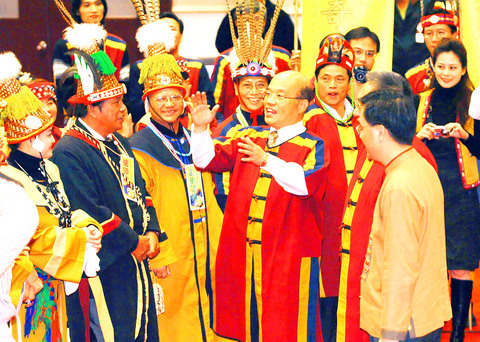Premier Su Tseng-chang (
The Sakiraya people yesterday became the nation's 13th officially recognized Aboriginal ethno-linguistic group.
Long wait

PHOTO: CNA
"We learn from history books that the Sakiraya have existed since the 17th century. They hid themselves among the Amis people because of war," Su said.
"Today, they have finally got their name back, but we still need to work hard to have our name back for this country -- Taiwan," he said.
Su was speaking at a ceremony announcing the addition of the Sakiraya to the list of formal Aboriginal tribal designations.
Su suggested yesterday that Aboriginal languages could be maintained by including them in every day activities.
"We should value and respect the diversity of our society. The best way to maintain and promote a language is to use it," Su said.
He lauded the Sakiraya people's efforts to preserve their language and culture and to gain official recognition as a distinct people.
Administration goal
Cabinet Spokesman Cheng Wen-tsang (
According to the Council of Indigenous Peoples, there are between 5,000 and 10,000 Sakiraya living in Hualien, Taoyuan and Taipei counties and in Keelung.
Cheng encouraged the council and the Sakiraya people to continue to promote their identity, so that more people would learn about the group's language and culture.

Taiwan is stepping up plans to create self-sufficient supply chains for combat drones and increase foreign orders from the US to counter China’s numerical superiority, a defense official said on Saturday. Commenting on condition of anonymity, the official said the nation’s armed forces are in agreement with US Admiral Samuel Paparo’s assessment that Taiwan’s military must be prepared to turn the nation’s waters into a “hellscape” for the Chinese People’s Liberation Army (PLA). Paparo, the commander of the US Indo-Pacific Command, reiterated the concept during a Congressional hearing in Washington on Wednesday. He first coined the term in a security conference last

DEFENSE: The National Security Bureau promised to expand communication and intelligence cooperation with global partners and enhance its strategic analytical skills China has not only increased military exercises and “gray zone” tactics against Taiwan this year, but also continues to recruit military personnel for espionage, the National Security Bureau (NSB) said yesterday in a report to the Legislative Yuan. The bureau submitted the report ahead of NSB Director-General Tsai Ming-yen’s (蔡明彥) appearance before the Foreign and National Defense Committee today. Last year, the Chinese People’s Liberation Army (PLA) conducted “Joint Sword-2024A and B” military exercises targeting Taiwan and carried out 40 combat readiness patrols, the bureau said. In addition, Chinese military aircraft entered Taiwan’s airspace 3,070 times last year, up about

A magnitude 4.3 earthquake struck eastern Taiwan's Hualien County at 8:31am today, according to the Central Weather Administration (CWA). The epicenter of the temblor was located in Hualien County, about 70.3 kilometers south southwest of Hualien County Hall, at a depth of 23.2km, according to the administration. There were no immediate reports of damage resulting from the quake. The earthquake's intensity, which gauges the actual effect of a temblor, was highest in Taitung County, where it measured 3 on Taiwan's 7-tier intensity scale. The quake also measured an intensity of 2 in Hualien and Nantou counties, the CWA said.

The Overseas Community Affairs Council (OCAC) yesterday announced a fundraising campaign to support survivors of the magnitude 7.7 earthquake that struck Myanmar on March 28, with two prayer events scheduled in Taipei and Taichung later this week. “While initial rescue operations have concluded [in Myanmar], many survivors are now facing increasingly difficult living conditions,” OCAC Minister Hsu Chia-ching (徐佳青) told a news conference in Taipei. The fundraising campaign, which runs through May 31, is focused on supporting the reconstruction of damaged overseas compatriot schools, assisting students from Myanmar in Taiwan, and providing essential items, such as drinking water, food and medical supplies,